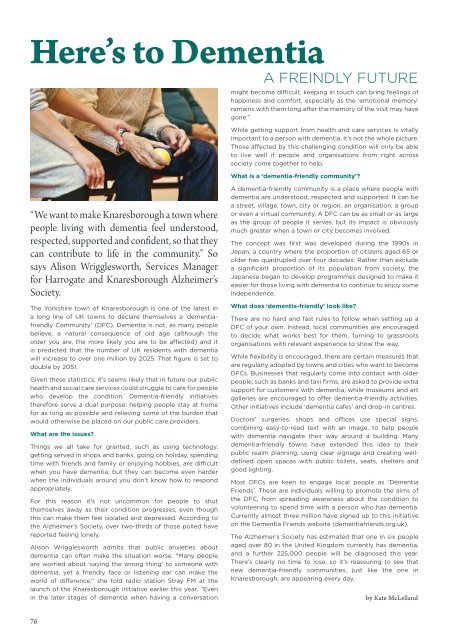I and A Mag Oct19
Telford Magazine
Telford Magazine
Create successful ePaper yourself
Turn your PDF publications into a flip-book with our unique Google optimized e-Paper software.
Here’s to Dementia<br />
A FREINDLY FUTURE<br />
might become difficult, keeping in touch can bring feelings of<br />
happiness <strong>and</strong> comfort, especially as the ‘emotional memory’<br />
remains with them long after the memory of the visit may have<br />
gone.”<br />
While getting support from health <strong>and</strong> care services is vitally<br />
important to a person with dementia, it’s not the whole picture.<br />
Those affected by this challenging condition will only be able<br />
to live well if people <strong>and</strong> organisations from right across<br />
society come together to help.<br />
What is a ‘dementia-friendly community’?<br />
“We want to make Knaresborough a town where<br />
people living with dementia feel understood,<br />
respected, supported <strong>and</strong> confident, so that they<br />
can contribute to life in the community.” So<br />
says Alison Wrigglesworth, Services Manager<br />
for Harrogate <strong>and</strong> Knaresborough Alzheimer’s<br />
Society.<br />
The Yorkshire town of Knaresborough is one of the latest in<br />
a long line of UK towns to declare themselves a ‘dementiafriendly<br />
Community’ (DFC). Dementia is not, as many people<br />
believe, a natural consequence of old age (although the<br />
older you are, the more likely you are to be affected) <strong>and</strong> it<br />
is predicted that the number of UK residents with dementia<br />
will increase to over one million by 2025. That figure is set to<br />
double by 2051.<br />
Given these statistics, it’s seems likely that in future our public<br />
health <strong>and</strong> social care services could struggle to care for people<br />
who develop the condition. Dementia-friendly initiatives<br />
therefore serve a dual purpose: helping people stay at home<br />
for as long as possible <strong>and</strong> relieving some of the burden that<br />
would otherwise be placed on our public care providers.<br />
What are the issues?<br />
Things we all take for granted, such as using technology,<br />
getting served in shops <strong>and</strong> banks, going on holiday, spending<br />
time with friends <strong>and</strong> family or enjoying hobbies, are difficult<br />
when you have dementia, but they can become even harder<br />
when the individuals around you don’t know how to respond<br />
appropriately.<br />
For this reason it’s not uncommon for people to shut<br />
themselves away as their condition progresses, even though<br />
this can make them feel isolated <strong>and</strong> depressed. According to<br />
the Alzheimer’s Society, over two-thirds of those polled have<br />
reported feeling lonely.<br />
Alison Wrigglesworth admits that public anxieties about<br />
dementia can often make the situation worse. “Many people<br />
are worried about ‘saying the wrong thing’ to someone with<br />
dementia, yet a friendly face or listening ear can make the<br />
world of difference,” she told radio station Stray FM at the<br />
launch of the Knaresborough initiative earlier this year. “Even<br />
in the later stages of dementia when having a conversation<br />
A dementia-friendly community is a place where people with<br />
dementia are understood, respected <strong>and</strong> supported. It can be<br />
a street, village, town, city or region, an organisation, a group<br />
or even a virtual community. A DFC can be as small or as large<br />
as the group of people it serves, but its impact is obviously<br />
much greater when a town or city becomes involved.<br />
The concept was first was developed during the 1990s in<br />
Japan, a country where the proportion of citizens aged 65 or<br />
older has quadrupled over four decades. Rather than exclude<br />
a significant proportion of its population from society, the<br />
Japanese began to develop programmes designed to make it<br />
easier for those living with dementia to continue to enjoy some<br />
independence.<br />
What does ‘dementia-friendly’ look like?<br />
There are no hard <strong>and</strong> fast rules to follow when setting up a<br />
DFC of your own. Instead, local communities are encouraged<br />
to decide what works best for them, turning to grassroots<br />
organisations with relevant experience to show the way.<br />
While flexibility is encouraged, there are certain measures that<br />
are regularly adopted by towns <strong>and</strong> cities who want to become<br />
DFCs. Businesses that regularly come into contact with older<br />
people, such as banks <strong>and</strong> taxi firms, are asked to provide extra<br />
support for customers with dementia, while museums <strong>and</strong> art<br />
galleries are encouraged to offer dementia-friendly activities.<br />
Other initiatives include ‘dementia cafes’ <strong>and</strong> drop-in centres.<br />
Doctors’ surgeries, shops <strong>and</strong> offices use special signs,<br />
combining easy-to-read text with an image, to help people<br />
with dementia navigate their way around a building. Many<br />
dementia-friendly towns have extended this idea to their<br />
public realm planning, using clear signage <strong>and</strong> creating welldefined<br />
open spaces with public toilets, seats, shelters <strong>and</strong><br />
good lighting.<br />
Most DFCs are keen to engage local people as ‘Dementia<br />
Friends’. These are individuals willing to promote the aims of<br />
the DFC, from spreading awareness about the condition to<br />
volunteering to spend time with a person who has dementia.<br />
Currently almost three million have signed up to this initiative<br />
on the Dementia Friends website (dementiafriends.org.uk).<br />
The Alzheimer’s Society has estimated that one in six people<br />
aged over 80 in the United Kingdom currently has dementia,<br />
<strong>and</strong> a further 225,000 people will be diagnosed this year.<br />
There’s clearly no time to lose, so it’s reassuring to see that<br />
new dementia-friendly communities, just like the one in<br />
Knaresborough, are appearing every day.<br />
by Kate McLell<strong>and</strong><br />
76










